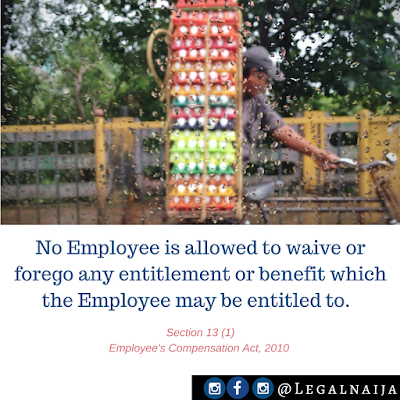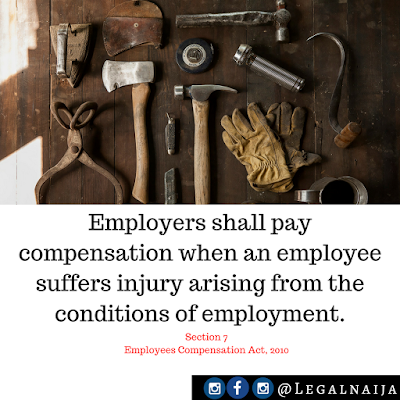
What to do when your employment is terminated unlawfully – Adedunmade Onibokun

There are many instances
when employees have had their employments terminated unlawfully by their
employers. Some of these employees never
see it coming and become infuriated at the company for a termination they deem
unlawful. Others are confused and wondering what to do next and how to secure
the next pay check in order to provide for their families and needs. Many however,
do not realise that their termination is unlawful and they have a right to sue
the employer for a breach of their contract of employment.
when employees have had their employments terminated unlawfully by their
employers. Some of these employees never
see it coming and become infuriated at the company for a termination they deem
unlawful. Others are confused and wondering what to do next and how to secure
the next pay check in order to provide for their families and needs. Many however,
do not realise that their termination is unlawful and they have a right to sue
the employer for a breach of their contract of employment.
Before we go further,
allow me explain that in law practice, the words “termination” and “dismissal”
in regard to employment contracts are not the same.
allow me explain that in law practice, the words “termination” and “dismissal”
in regard to employment contracts are not the same.
Though, “Termination” or “Dismissal” of an
employee by the employer translates into bringing the employment to an end.
Under a termination of appointment, the employee is enabled to receive the
terminal benefits under the contract of employment. The right to terminate is
mutual in that either may exercise it. “Dismissal” on the other hand
is punitive and depending on the contract of employment very often entails a
loss of terminal benefits.
employee by the employer translates into bringing the employment to an end.
Under a termination of appointment, the employee is enabled to receive the
terminal benefits under the contract of employment. The right to terminate is
mutual in that either may exercise it. “Dismissal” on the other hand
is punitive and depending on the contract of employment very often entails a
loss of terminal benefits.
To
further explain, most contract agreements contain a clause stating that either
parties may terminate an employment if due notice is given or payment of a month’s salary in lieu of notice.
If an employment comes to an end this way, it is a termination. However, to be
dismissed usually means that the employee was relieved due to actions bothering
on misconduct.
further explain, most contract agreements contain a clause stating that either
parties may terminate an employment if due notice is given or payment of a month’s salary in lieu of notice.
If an employment comes to an end this way, it is a termination. However, to be
dismissed usually means that the employee was relieved due to actions bothering
on misconduct.
So when can an employment be said to
have been terminated unlawfully?
have been terminated unlawfully?
The
Supreme Court held in Eze v. Spring Bank Plc
(2011) LPELR-2892, that, to
determine whether the dismissal of an employee was correct or wrong, the terms
of employment of the aggrieved employee must be examined to see whether the
correct procedure was followed. Where there is departure from the prescribed
procedure or a violation of the elementary rules of natural justice, then the
dismissal is unlawful.
Supreme Court held in Eze v. Spring Bank Plc
(2011) LPELR-2892, that, to
determine whether the dismissal of an employee was correct or wrong, the terms
of employment of the aggrieved employee must be examined to see whether the
correct procedure was followed. Where there is departure from the prescribed
procedure or a violation of the elementary rules of natural justice, then the
dismissal is unlawful.
For
instance, if the contract of employment provides that either party may
terminate the employment upon notice or payment of salary in lieu of notice,
any letter of termination served on the employee not in line with the above
provision will be unlawful. Furthermore,
assuming an employee was dismissed for gross misconduct without giving the said
employee an opportunity to defend the allegations. Such an act will also amount
to an unlawful dismissal.
instance, if the contract of employment provides that either party may
terminate the employment upon notice or payment of salary in lieu of notice,
any letter of termination served on the employee not in line with the above
provision will be unlawful. Furthermore,
assuming an employee was dismissed for gross misconduct without giving the said
employee an opportunity to defend the allegations. Such an act will also amount
to an unlawful dismissal.
If
a party believes they have been terminated or dismissed unlawfully, such party
can use the internal organs made available by the company to state a case or
redress the issue. However, if that does not yield a solution such aggrieved
employer may resort to the court and claim damages against the employer. It is
important to note that such a case must be brought before the court within 6
(six) years of the date the employee was let go.
a party believes they have been terminated or dismissed unlawfully, such party
can use the internal organs made available by the company to state a case or
redress the issue. However, if that does not yield a solution such aggrieved
employer may resort to the court and claim damages against the employer. It is
important to note that such a case must be brought before the court within 6
(six) years of the date the employee was let go.
The
National Industrial Court is vested with the exclusive jurisdiction of
adjudicating over employment and labour matters by virtue of Section 254C
of the Constitution of the Federal Republic of Nigeria (Third Alteration) Act
2010. Therefore, all such matters are instituted
at the National Industrial Court. The law is now settled that in an
award of damages for unlawful dismissal in ordinary master/servant relationship
the measure of damages is what the servant would have earned in lieu of notice
plus his accrued benefits up to the time of his termination.
National Industrial Court is vested with the exclusive jurisdiction of
adjudicating over employment and labour matters by virtue of Section 254C
of the Constitution of the Federal Republic of Nigeria (Third Alteration) Act
2010. Therefore, all such matters are instituted
at the National Industrial Court. The law is now settled that in an
award of damages for unlawful dismissal in ordinary master/servant relationship
the measure of damages is what the servant would have earned in lieu of notice
plus his accrued benefits up to the time of his termination.
The courts usually shy
away from ordering a reinstatement of the employee. For it is a principle of
law that no employee can be forced on an unwilling employer. This is
illustrated in the court’s decision in U.B.N.
Ltd. v.Ogboh (1995) 2 NWLR (Pt.380)647 where it was held that the plaintiff in appropriate cases of such unlawful
dismissal or wrongful termination of employment is left to his remedy in
damages as no servant may generally be imposed by the court on an unwilling
master even where the master’s behaviour is wrongful.
away from ordering a reinstatement of the employee. For it is a principle of
law that no employee can be forced on an unwilling employer. This is
illustrated in the court’s decision in U.B.N.
Ltd. v.Ogboh (1995) 2 NWLR (Pt.380)647 where it was held that the plaintiff in appropriate cases of such unlawful
dismissal or wrongful termination of employment is left to his remedy in
damages as no servant may generally be imposed by the court on an unwilling
master even where the master’s behaviour is wrongful.
Adedunmade Onibokun, Esq.
Adedunmade is the Principal
Partner of Adedunmade Onibokun & Co., a corporate commercial law firm
located in Lagos, Nigeria. He also publishes the Legalnaija blog, an
online platform dedicated to educating Nigerians on their legal rights and
obligations. He can be reached via dunmadeo@yahoo.com
Partner of Adedunmade Onibokun & Co., a corporate commercial law firm
located in Lagos, Nigeria. He also publishes the Legalnaija blog, an
online platform dedicated to educating Nigerians on their legal rights and
obligations. He can be reached via dunmadeo@yahoo.com

